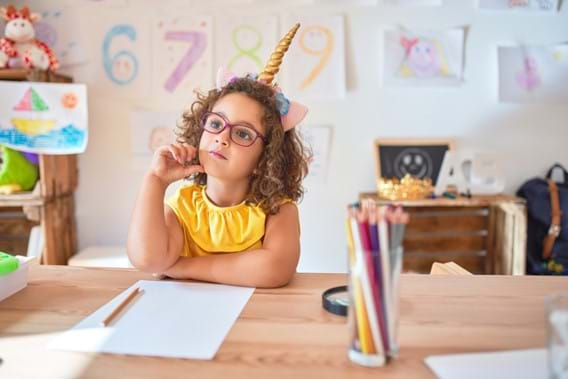
Philosophy for Kids: A Useful Tool, Pandemic or Not

Written by: Kaleido moms and dads
For many families, social distancing because of COVID-19 means spending a lot more time together at home. Always being under the same roof is undoubtedly a source of numerous everyday challenges, especially in terms of human relationships. These can take the form of squabbles between children (or even between parents) for lack of patience or irritability siblings may feel and express. Strong emotions and “negative” behaviours stem, in many cases, from the child’s or parent’s personality, and are part of human nature itself. This may come as a surprise, but the pandemic situation provides an interesting opportunity for self-discovery and improvement as an individual, as well as a family. But how exactly does one go about this? Philosophy for kids might be a good place to start. Don’t worry, it’s not as complex as it sounds!
Asking Questions About the Pandemic to Develop Critical Thinking
COVID-19 is top of mind for everyone; it’s all over the news and can be emotionally taxing. But being informed and asking questions builds critical thinking. Accurate information allows the mind to rationalize particular situations or concepts that can trigger stress. With a critical mind, we can challenge misleading news that is often alarmist and pessimistic, and we can moderate negative reactions that would normally erupt momentarily in response to information of concern to us.
Fostering Dialogue
Rest assured, critical thinking does not only develop in a pandemic. On the contrary, you can learn about any subject at any time, regardless of age (sorry in advance if your children ask you a gazillion questions!). And the right tool for the job is communication!
Dialogue fosters interaction, reflection and, above all, awareness of others and their listening ear. Dialogue is about equality between people, without judgment: “I listen to you and accept your opinion; you listen to me and accept my opinion.” Together, people can be open to differences and engage in debate with mutual respect. As time passes, spontaneous bickering is likely to be avoided if listening and communication are the cornerstones of your relationships.
Exploring Social Values
By encouraging children to ask questions, they gain a better understanding of the pandemic as well as some of our society’s core values. For instance, questions such as “Why do we have to stay home?” or “Why can’t I hug Grandma?” allow parents to explain the importance of public health and the fact that the greater good sometimes requires individual sacrifices, such as staying home and social distancing. You won’t get a better opportunity to instill a sense of civic responsibility as an individual, family and community member.
These questions can also serve as an opening to teach the importance of sharing and social equality, especially within the family unit. By emphasizing the benefits of sharing, you can teach children about the well-being of society as a whole, as well as about themselves.
To raise your children’s awareness of societal values, why not encourage them to take action? Although they were originally designed for teachers, the tools developed by the Canadian Teachers’ Federation aim to help kids undertake social action projects. Three versions are available based on age: K-4 years, 5 to 8 years and 9 to 12 years.
Exploring Emotions
Self-knowledge is undoubtedly a lifelong learning process, so why not take advantage of the extra time under the same roof to start exploring human emotions? With everyone at home full time, family life can be demanding and a breeding ground for emotional conflict. Words are a powerful tool for bringing our feelings to light. This may seem obvious as an adult, but for children, dialogue can be a guiding principle.
Younger children can be helped in identifying the emotions of book characters. This allows you to verbalize the whole thing, which helps your child to better identify and communicate their own feelings with practice. You could also hang a poster of emotions on the fridge or in their room. You can even create one with your child for a little extra quality time. A child who is able to quickly identify emotions will find it easier to communicate in a healthy way.
Older kids may find dialogue more difficult, especially during adolescence. However, you can encourage your kids to explore new ways of dealing with their emotions, including learning how to control them. For instance, if your house can accommodate it, you could designate a room as a quiet zone, to which any member of the family can quietly retreat. When leaving the room, your child will likely feel more inclined to discuss the source of their emotional reaction. If you can’t devote an entire room to tranquility, perhaps you can create small signs indicating a need for solitude. This avoids unnecessary friction, as the need has been communicated even if nonverbally.
In closing, it’s important to remember that every child is different and philosophy has many paths. But developing critical thinking or self-knowledge through dialogue is a good starting point. Here are some useful links that should provide a little food for thought and help bring out the philosopher in your child—and maybe even yourself!
- The Critical Thinking Consortium
- Brila Youth Projects
- Reboot Foundation
- Center for Public Philosophy
- Jana Mohr Lone, “Why are kids asking such big questions during the pandemic?”


